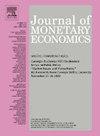新凯恩斯主义模型中的外汇干预:政策、传导和福利
IF 4.3
2区 经济学
Q1 BUSINESS, FINANCE
引用次数: 0
摘要
本文将外汇干预(FXIs)引入标准的新凯恩斯主义小型开放经济模型。求解了最优FXI策略,提出了可实施的策略规则,研究了FXI的传导机制。依靠投资组合平衡渠道,偏离未披露利率平价(UIP)反映了财务效率低下。无论面临何种类型的冲击,寻求稳定UIP溢价的政策规则都会使经济朝着其最佳配置方向发展。用外汇储备平滑来扩大规则,将进一步改善福利。本文讨论了在何种条件下,优保价的严格目标是最优的。fxi是通过影响UIP溢价来传递的。购买外汇储备增加了溢价,从而提高了代理人实际回国所面临的压力,并使本币贬值。因此,国内需求收缩,出口扩大。结果对金融部门的各种建模替代方案具有鲁棒性。本文章由计算机程序翻译,如有差异,请以英文原文为准。
Foreign exchange interventions in the New-Keynesian model: Policy, transmission, and welfare
The paper introduces foreign exchange interventions (FXIs) into an otherwise standard New-Keynesian small open economy model. It solves for the optimal FXI policy, suggests an implementable policy rule, and studies the transmission mechanism of FXIs. Relying on the portfolio balance channel, deviations from the uncovered interest rate parity (UIP) reflect financial inefficiencies. A policy rule that seeks to stabilize the UIP premium moves the economy toward its optimal allocation, regardless of the type of shocks it faces. Augmenting the rule with foreign reserves smoothing further improves welfare. The paper discusses the conditions under which strict targeting of the UIP premium is optimal. FXIs are transmitted by affecting the UIP premium. Purchasing foreign reserves increases the premium, thereby raising the effective return home agents face and depreciating the domestic currency. Consequently, domestic demand contracts and export expands. The results are robust to a variety of modeling alternatives for the financial sector.
求助全文
通过发布文献求助,成功后即可免费获取论文全文。
去求助
来源期刊

Journal of Monetary Economics
Multiple-
CiteScore
7.20
自引率
4.90%
发文量
90
审稿时长
74 days
期刊介绍:
The profession has witnessed over the past twenty years a remarkable expansion of research activities bearing on problems in the broader field of monetary economics. The strong interest in monetary analysis has been increasingly matched in recent years by the growing attention to the working and structure of financial institutions. The role of various institutional arrangements, the consequences of specific changes in banking structure and the welfare aspects of structural policies have attracted an increasing interest in the profession. There has also been a growing attention to the operation of credit markets and to various aspects in the behavior of rates of return on assets. The Journal of Monetary Economics provides a specialized forum for the publication of this research.
 求助内容:
求助内容: 应助结果提醒方式:
应助结果提醒方式:


